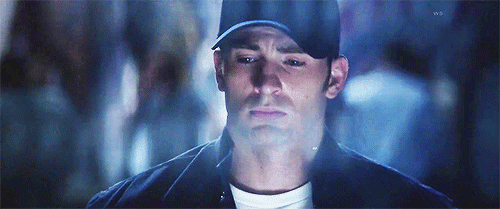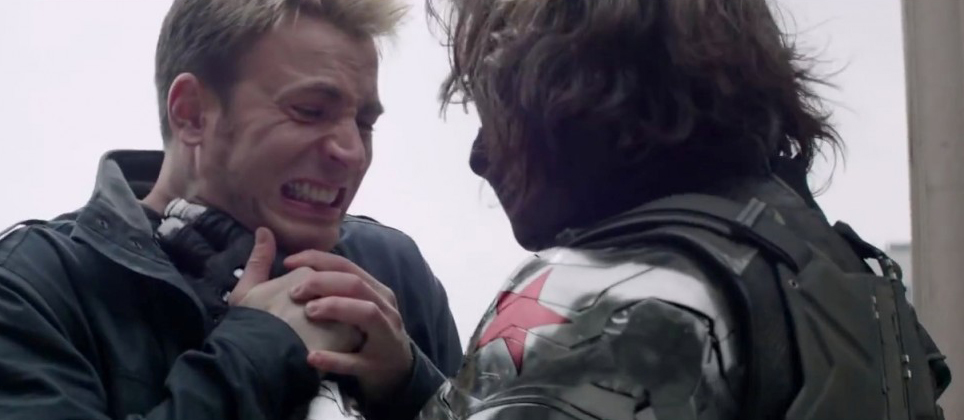Warning: This review of Captain America: The Winter Soldier contains spoilers. Spoilers for a reveal that is totally worth being unspoiled for. You have been warned.
It’s perhaps the lot of people who write with the intention of being funny (such as myself) that it’s so much easier to be funny with things that are bad than things that are good. So when I’m confronted by a Good Movie, I often find myself being a little… nitpicky.
Why is the glass on the elevator in the SHIELD building not shatter-proof? The glass on Nick Fury’s car needed a ram, but Steve can just jump out of the elevator? What the hell?

See, that kind of stuff would be okay if this movies sucked, like Thor 2 did, but since this movie was good, it seems petty and unfair. But how interesting could I possibly be if I just spend my whole time listing off all the ways in which this movie worked. The ways that it was thoughtful, and subtle, and just well done?
Well, I guess we’ll find out, because that’s what I plan to do. To be fair, I do have maybe one criticism that could be defined as “major,” but you’ll have to wait for that.

The true strength of this movie is in the characters and their relationships with each other, as well as their view of themselves. And, what is especially refreshing: none of these relationship are romantic. (Yes, I know this will piss off the Steve/Bucky shippers… do your worst.)
I suppose the best place to start is with Steve, still struggling to integrate himself to this wacky new world he’s found himself in. He even has an old-timey notebook and pencil that he carries around to remind himself to go watch the moon landing.
But for all the adorable quaintness of that, much more important is his struggle to reconcile his view of himself, as someone who did the right thing and fought on the right side, with the moral ambiguity of the modern day SHIELD. (And fair point, Steve. The morality is so ambiguous that the plan of the “good guys” was only barely altered to be the plan of the villains.) This is all wonderfully shown in Steve’s trip to the museum, where he goes to reconnect with those simpler times, when he didn’t have to grapple with what the right thing was.

This meaning was re-enforced at the end of the movie, when Bucky goes to the same place to reconnect with his own “true self.” Again, going back to a time when he knew who he was and what was right.
The thing he’s grappling with is Project Insight. These are three heilcarriers that will do all sorts of fancy, privacy invading things to fly around and preemptively eliminate threats.
Yeah, it’s a little problematic.

Bucky himself is rather the personification of this conflict, and the ability of the need for control and “security” (as represented by Hydra) to make good people do bad things—to pervert the intentions for peace and freedom. That’s what the Winter Soldier is, and it’s horrible. It’s as much a perversion of Bucky as Hydra is a perversion of SHIELD. Steve’s determination to save him is also his determination to save his ideals. And it’s ultimately the rejection of Fury’s directive to “trust no one”. Steve does trust. He trusts in the fundamental goodness of humanity, and the possibility of both peace and freedom.

It’s also the ultimate rejection of that thing that’s been bugging me the most in the MCU so far: the glorification of “rugged individualism”.
Most of the movie is carried by a cooperative relationship. I’m talking, of course, of Steve and Natasha and their Scooby-Doo mystery to figure out who killed Nick Fury.
Now, I haven’t been the hugest fan of Natasha Romanoff thus far. Especially not in IM2 where she was the worst kind of fan service imaginable. But this is the movie where she comes into her own.
My first thought was a little “wow, she became an entirely different character suddenly.” Like, when has she ever been snarky? But after giving it some thought I think that could be more accurately phrased as “wow, she became A Character suddenly.” Even in The Avengers, where she was more than decorative and her backstory was hinted at, there are very few genuine moments for her. This is the first time she’s ever had a personality, and vulnerabilities, and actual motivation. And it’s rather wonderful.

But, on the other hand, it just makes me more pissed off that we haven’t had a Black Widow movie. Her backstory is at least as interesting as Steve’s, and much more so than fucking Tony Stark’s. Though we all know the answer to this mystery, so I will not belabour the point.
Speaking of mysteries, yeah, our two heroes follow the clues and end up in an underground facility containing an old-timey supercomputer that is also the consciousness of Doctor Arnim Zola. You know, the diminutive science guy attached to Hydra in Captain America: The First Avenger?
He’s a computer now, and he’s very free with information. (Another thing that I would be way harsher on in a worse movie.) Not only does he reveal that Hydra, the rogue Nazi science division who broke away because the Nazis weren’t Nazi enough, is still around, but also that it has been a secret sleeper inside SHIELD from the very beginning. While SHIELD has been trying to make peace and bring the world together, Hydra has been sowing the seeds of division and chaos. And now, they’re finally ready to strike because the world is sufficiently fucked up.

A little aside here: the world is ripe for a Hydra takeover because it’s so chaotic now? Really? Like, more than in 1950? Or 1982? Or 1991? This kind of reminds me of Socrates complaining about how kids these days in Athens are so lazy and disrespectful.
And a major aside: I have a few problems with this Hydra narrative.
I’ve been very open during the course of this project about how excited I get about conspiracies, and secret societies, and things like that. I’ve also praised Hydra as excellent villains. That all stands, but this story about Hydra as a “cancer growing inside SHIELD”or whatever, runs into the same problem that a lot of real life conspiracy theories run into: it has to be simultaneously enormous, involving a ridiculous amount of people, and perfectly secret.

This just doesn’t work. Like, how long was Watergate kept secret? And that was just a few guys.
And this movie makes it seem like a not unsubstantial percentage of SHIELD’s people are in on this. And I get that these are all super-spies, but seriously, no one figured it out? It’s just not plausible.
At what point does the concept of a fifth column just get silly, when you have such a huge swathe of the organization involved? What’s the point of secrecy at that point?
It doesn’t break the movies, but yeah, it’s an issue I have.
Anyway, Compu-Zola has also written an algorithm that has used everyone’s Facebook to determine the 10 or so million people who have the will to oppose them. See, Hydra plans to use the helicarriers from Project Insight to pick them all off.
Like I said, only really a modification of the Good Guys’ plan.
Our heroes escape a ‘splosion, now armed with this information, and decide to do something about it. They go find Sam Wilson, some guy that Steve bonded with while jogging once, and it turns out he’s a crazy Air Force guy with a crazy suit with wings. And he agrees to help them, because it’s the right thing to do.

And that I think is the key: Steve’s faith vindicated.
It happens again in the third act, when they expose Hydra to the rest of SHIELD. Steve believes that most of them will do the right thing, and his faith is rewarded. Almost all the non-Hydra SHIELD people unite to stop their evil plan.
Including Derpy Curly Haired Guy, the real hero of the film, whose courage through fear would have made Ned Stark proud. The same theme of cooperation runs through this part of the movie too: “We’re the only air support Captain America has.”

An interesting foil to Steve Rogers is Nick Fury himself. His actions in Bogata are not too dissimilar from Steve’s actions in Captain America: The First Avenger, when he saved the 107th from that crazy Hydra base. But Nick has none of Steve’s idealism; he’s at least partially bought into the narrative that brute force is the only way to guarantee peace. His directive to “trust no one” seems to him to be the only way to save SHIELD (or at least save civilization as we know it), but it’s Steve’s decision to trust others that really accomplishes that in the end.
Nick’s arc within this film is almost a rediscovery of that idealism, his reaffirming what his life’s work was supposed to be about.
That’s why the point about destroying SHIELD was so important. It wasn’t the organization that was important so much as the purpose that it was supposed to serve. And when that purpose is hijacked, it can only be recovered by idealists, like Steve.
I think that’s what works about this movie. Even though it’s about everything we thought was good turing out to be the opposite, it’s still a movie about the fundamental goodness of human nature, about the way we can rise to the occasion in the face of evil, and just be decent people.
Yeah, Steve Rogers is still the best part of the MCU.


